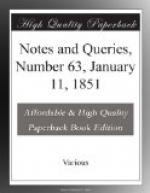C.W.G.
* * * * *
MISCELLANEOUS.
NOTES ON BOOKS, SALES, CATALOGUES, ETC.
The Camden Society have just issued to the members a highly important volume, Walter Mapes De Nugis Curialium. The best idea of the interesting character of this work may be formed from the manner in which it is described by its editor, Mr. Thomas Wright, who speaks of it as “the book in which this remarkable man seems to have amused himself with putting down his own sentiments on the passing events of the day, along with the popular gossip of the courtiers with whom he mixed;” and as being “one mass of contemporary anecdote, romance, and popular legend, interesting equally by its curiosity and by its novelty.” There can be little doubt that the work will be welcomed, not only by the members of the Camden Society, but by all students of our early history and all lovers of our Folk Lore.
Though we do not generally notice the publication of works of fiction, the handsome manner in which, in the third volume of his Bertha, a Romance of the Dark Ages, Mr. MacCabe has thought right to speak of the information which he obtained, during the progress of his work, through the medium of NOTES AND QUERIES, induces us to make an exception in favour of his highly interesting story. At the same time, that very acknowledgment almost forbids our speaking in such high terms as we otherwise should of the power with which Mr. MacCabe has worked up this striking narrative, which take its name from Bertha, the wife of the profligate Henry IV. of Germany; and of which the main incidents turn on Henry’s deposition of the Pope, and his consequent excommunication by the inflexible Gregory the Seventh. But we the less regret this necessity of speaking thus moderately, since it must be obvious that when an accomplished scholar like the {31} author of the Catholic History of England, to whom old chronicles are as household words, chooses to weave their most striking passages into a romance, his work will be of a very different stamp from that of the ordinary novelist, who has hunted over the same chronicles for the mere purpose of finding startling incidents. The one will present his readers, as Mr. MacCabe has done, with a picture uniform in style and consistent in colouring, while the other will at best only exhibit a few brilliant scenes, which, like the views in a magic lanthorn, will owe as much of their brilliancy to the darkness with which they are contrasted as to the skill of the artist.
Messrs. Sotheby and Co. will sell, on Wednesday next and three following days, the valuable Collection of Coins and Medals of the Rev. Dr. Neligan, of Cork; and on the following Monday that gentleman’s highly interesting Antiquities, Illuminated MSS., Ancient Glass, Bronzes, Etruscan and Roman Pottery, Silver Ring Money, &c.
To those who have never studied what Voltaire maliciously designated “the science of fools with long memories,” but yet occasionally wish to know the families which have borne certain mottoes, the new edition of The Book of Mottoes will be a very acceptable source of information.




